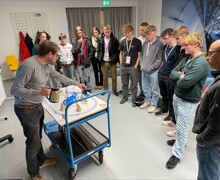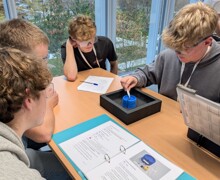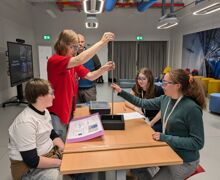News
Students Explore the Atom-Splitting World of Physics at Top European Science Facility
13th December 2024Students from Kingsbridge Community College (KCC) have visited Geneva this term.
The A-Level physics students went to the Swiss city on an educational trip that included a visit to the United Nations headquarters. The United Nations Office at Geneva is housed at the historic Palais des Nations, originally built for the League of Nations in the 1930s, overlooking Lake Geneva, the Palais is the largest centre for conference diplomacy in the world.
The group also visited the European Organization for Nuclear Research, known as CERN.At CERN, scientists probe the fundamental structure of the particles that make up everything around us using the world's largest and most complex scientific instruments. During their experiments subatomic particles are made to collide together at close to the speed of light. The process gives them clues about how the particles interact, and provides insights into the fundamental laws of nature.
The students toured the cutting edge facility and got to see the world’s largest physics experiment - levitated magnets on superconductors in liquid nitrogen - up close.
At Kingsbridge Community College, post GCSE students have the option to pursue science either at A- level or in the vocational context of a Level 3 BTEC course. Both routes are extremely popular and students have amazing opportunities to pursue their passion in science post GCSE with many going on after sixth form to study science. Students have the chance to be involved in science clubs, Royal Institute master classes, Marine Champions groups, Youth STEM award and much more.
Tina Graham, Principal at Kingsbridge Community College, said:
“At Kingsbridge Community College we are committed to providing a stimulating, engaging and intellectually challenging learning environment to enable all our students to develop scientific consciousness.
“We aim to give all students a strong understanding of the world around them whilst acquiring specific skills and knowledge to help them to think scientifically, to gain an understanding of scientific processes and an appreciation of the uses and implications of science-based issues that may affect their own lives, the direction of society and the future.
“This trip to Geneva is something we think adds real value to the studies of our physics students. Taking them right to the heart of the biggest scientific action in Europe is certainly something they won’t forget.”
Matthew Shanks, CEO of Education South West said:
“It’s great that these physics students had the opportunity to visit Geneva and take in so many important sights. At Education South West, we want learning to come alive and for young people to understand how what they learn in the classroom can be used in the real world. This trip is a strong example of how to do this and I hope the students both enjoyed their visit and learned a lot.”






